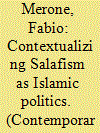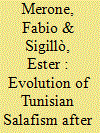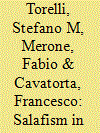|
|
|
Sort Order |
|
|
|
Items / Page
|
|
|
|
|
|
|
| Srl | Item |
| 1 |
ID:
191626


|
|
|
|
|
| Summary/Abstract |
This article examines Salafism as part of what it defines as ‘Islamic politics’, a modern phenomenon of activism and human agency based on an ideological conception of Islam—the ‘Islamic political theology of the praxis’—that is both a comprehensive vision of the world and its pro-active implementation. This article’s starting point is Wiktorowicz’s 2006 seminal article, ‘Anatomy of the Salafi movement’. This article highlights the epistemological underpinning of his work. Analysing Wiktorowicz’s broader intellectual contribution, especially his 2004 book on ‘Islamic activism’, it is possible to emphasize that Wiktorowicz was interested in epistemologically centring the study on Islamic activism (Islamism and Salafism together). From this starting point, the article argues that both Salafism and Islamism should be considered part of the practical activity of ‘doing politics’ within an ideological vision of Islam. The term proposed here is thus ‘Islamic politics’, a frame through which the development of both Islamism and Salafism is examined. In line with Wiktorowicz, this article supports the contention that the context matters, but it also argues that ideology as also a relevant factor.
|
|
|
|
|
|
|
|
|
|
|
|
|
|
|
|
| 2 |
ID:
181094


|
|
|
|
|
| Summary/Abstract |
What shape does Salafism take in Tunisia after the ban of the Salafi-Jihadi group Ansar al-Shari‘a and the wave of securitization carried out by national authorities? This article argues that a constraining legal context put Salafism's doctrinal rigidity in tension with its survival and ultimately prompted a residual current of Salafi actors to accommodate their stance toward Malikism, the prevalent school (madhhab) in the country. This adaptation is at odds with contemporary Salafism, which traditionally dismisses all four law schools (lā madhabiyya), rejects their blind imitation (taqlῑd), and claims the superiority of the Qur'an, hadith, and consensus of the salaf (pious predecessors) over jurisprudence (fiqh). To account for this puzzle, this article scrutinizes the historical development of Salafism and the evolution of its stance toward Malikism across three generational waves. It notably shows how religious securitization associated with the promotion of a “moderate” Islam pushed Salafi actors to redefine their ideology to preserve their preaching and teaching activities. We call Salafi-Malikism the outcome of this adaptive strategy. Drawing on the Tunisian case, we argue that, despite its purist claims, Salafism is not an immutable religious current, but can take different trajectories to survive in constraining environments.
|
|
|
|
|
|
|
|
|
|
|
|
|
|
|
|
| 3 |
ID:
147294


|
|
|
|
|
| Summary/Abstract |
In postrevolutionary Tunisia, local politics have played an important role in the reconstruction of political authority in the wake of regime change. Continuities of governance between the old and new regimes, the local emergence of new social and political actors, and the competition between new and old local actors, as well as between them and the central state, have challenged the authority of national institutions and elected officials. As national actors attempted to rein in local experiments with "direct democracy," local politics generated resistance toward the Islamist-led Ennahda coalition.
|
|
|
|
|
|
|
|
|
|
|
|
|
|
|
|
| 4 |
ID:
118989


|
|
|
|
|
|
|
|